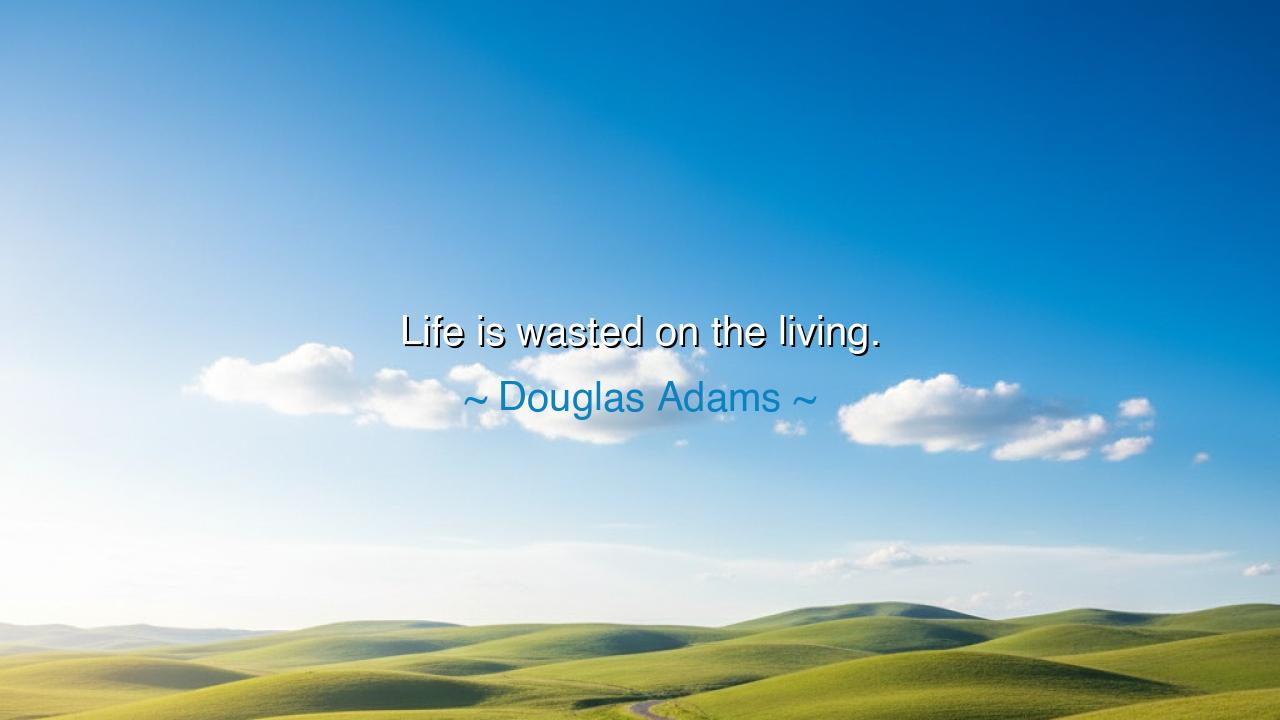
Life is wasted on the living.






“Life is wasted on the living.” Thus quipped Douglas Adams, the master of cosmic wit and existential comedy, whose words—though born of humor—carry a weight of timeless truth. At first hearing, it sounds like jest, a clever paradox crafted for laughter. Yet beneath its irony lies a profound lament: that those who possess life so rarely live it. Adams, the author of The Hitchhiker’s Guide to the Galaxy, was a man who saw both the absurdity and the wonder of existence. In this short, sharp phrase, he exposes the tragedy of humanity—that men and women who breathe, dream, and walk upon a living world often fail to awaken to its beauty, while those who have passed—who can no longer live—might understand too late the sacredness of the gift they once held.
To say that life is wasted on the living is to speak of a blindness that afflicts the human heart. The living, surrounded by the miracle of existence, grow accustomed to it. They trade wonder for routine, curiosity for comfort, gratitude for expectation. The child, who once marveled at the color of the sky and the sound of rain, becomes the adult who passes beneath the same heavens without looking up. The sacred becomes ordinary; the extraordinary becomes invisible. Adams, in his dry wisdom, is not mocking life but mourning our neglect of it. He reminds us that the true miracle of existence lies not in surviving it, but in noticing it.
This idea is not new. The ancients spoke it in many tongues. The Greek philosopher Socrates declared that “the unexamined life is not worth living,” and in that he meant much the same thing—that life without awareness is a shadow, a motion without meaning. The Stoics warned that we live as though we had infinite time, though death walks beside us every day. And the poet Horace urged his readers to carpe diem, “seize the day,” before it slipped through their fingers. Across the centuries, wise men have seen what Adams saw: that the living squander life by forgetting to live.
Consider the story of Anne Frank, a young girl who, in the darkest days of persecution, wrote with joy of the world she could barely see. Confined in hiding, hunted for her faith, she still marveled at the beauty of the sky through a crack in the attic window. “Think of all the beauty still left around you,” she wrote, “and be happy.” She, who lived so little in years, lived more deeply than many who roam free beneath the sun. In her short, fragile existence, she proved the opposite of Adams’s lament—she did not waste life, for she cherished it in every trembling moment.
Adams’s quote, though born of humor, is not cynicism but a challenge. He calls upon us to awaken from our sleepwalking—to stop confusing existence with living. He reminds us that we are mortal beings on a tiny blue world, hurtling through a vast and silent cosmos. To waste such a miracle on worry, greed, or indifference is a kind of cosmic crime. Life is brief, yes—but within its brevity lies its splendor. Each breath, each sunrise, each act of kindness is a moment of eternity clothed in time. To live rightly, one must learn to see again—to recover the eyes of the child, the heart of the poet, the curiosity of the wanderer.
And how, then, shall we do this? By presence. By pausing amid our haste to taste the sweetness of a moment fully lived. By speaking our love instead of postponing it. By choosing courage over comfort, wonder over worry, gratitude over complaint. To live, truly live, is to inhabit each instant with the fullness of being, to know that this breath, this touch, this glance, may never come again—and yet to rejoice in it. The living waste life because they imagine it will always continue; the wise cherish it because they know it will not.
So, my child of the restless age, take this truth as both warning and blessing: do not let life slip through your fingers while you are busy with the small things. Do not wake one day and realize that you have only existed. Live now, while your heart still beats and your eyes still see. Laugh, love, create, forgive, and wonder—for these are the acts that transform mere living into being truly alive.
For in the end, Douglas Adams’s words are not despair but invitation. When he says “Life is wasted on the living,” he is urging us not to waste it ourselves. To see, to feel, to marvel, to give—to make of our short journey something radiant and true. And when we do, when we live with open eyes and a grateful heart, then the joke turns inside out, and life is no longer wasted on us—for we have become, at last, not merely the living, but the alive.






AAdministratorAdministrator
Welcome, honored guests. Please leave a comment, we will respond soon